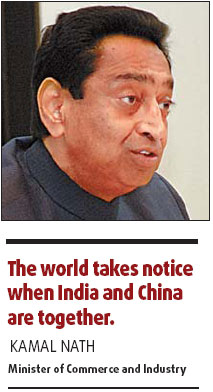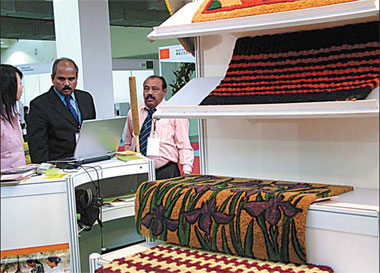A champion of stronger Sino-Indian trade
By Debasish Roy Chowdhury (China Daily)
Updated: 2008-01-17 07:22
Updated: 2008-01-17 07:22
The worst victim (of a total breakdown of the Doha Development Round talks of the World Trade Organization) would be the WTO and its underlying premise of free and fair trade, as it would lose its credibility, writes India's Commerce and Industry Minister Kamal Nath in his newly published book, India's Century.
It seems odd coming from a man Western economies see as one of the main speed bumps on the road to a successful trade agreement, but that's what Nath brings to the global trade talks table - consummate negotiating skills and an ability to rally disparate political and economic interests against a common cause to push for a greater conviction.
|
An Indian stall at a Shanghai exhibition displays Indian tapestries. Trade between China and India has seen a rapid growth in recent years, and is likely to meet the target set for 2010 this year itself. Shao Chang |
Nath is convinced that the international trading system is fundamentally flawed because of the distortions in agricultural subsidies and industrial tariffs, and it's up to the emerging economic giants like China, Brazil and India to rectify it. That's why, Nath maintains, India and China always coordinate their positions at multilateral forums: "We always discuss between ourselves before taking a position. Sometimes it may purely pertain to India and not concern China at all, and vice-versa. But we stand by each other" because "the world takes notice when India and China are together".
That is precisely why Nath is so important to China. He is not only a key player in developing the booming Sino-Indian ties, but also the person China has to deal with the most on a regular basis in synergizing the developing nations' bloc in complex global negotiations at forums such as the WTO.
It helps that Nath's conviction about the frailties of the world economic order is matched only by his passion for promoting Sino-Indian trade ties, which stems from the enormous respect he has for China.
"China has demonstrated to the world how to transform oneself from a closed to an open economy. It has excelled in whatever it has taken up, whether it's in the cultural field, industry, sports, or academics. You name it and it has done it. China has shown the world that whatever it sets out to do, it does," he says.
He supports China's position that it be treated differently because it has already conceded a lot to join the WTO. "We maintain that China should get concessions in the WTO. China has conceded a lot for its accession to the WTO It was the price China had to pay to join the WTO. China was really squeezed; let me say this. We recognize that China, rightly, says that as a newly acceded member, it should get a breather, that it should not be made mandatory for it to do what other members are required to do. We support China fully on this."
During the just-concluded visit by Indian Prime Minister Manmohan Singh to China, Nath met his Chinese counterpart Chen Deming to review their cooperation in the WTO. It was yet another sign of the importance the two sides put on harmonizing their stances.

The meeting between Nath and Chen gained added importance because of their meetings with visiting WTO Director-General Pascal Lamy. Before meeting Lamy, Nath said India and China were working together to create a new "architecture and pattern" of multilateral negotiations.
"India and China do not necessarily have the same sensitivities but both having a large agricultural base have similar concerns," Nath told reporters.
Nath, a stalwart in New Delhi's corridors of power, is a veteran leader of the Congress Party that heads the current United Progressive Alliance (UPA) government in India. Known to have been a close associate of former prime minister Indira Gandhi's son Sanjay Gandhi, with whom he attended India's prestigious Doon School, where India's rich and the powerful send their children, Nath joined the Congress Party in 1968.
After Sanjay Gandhi, then seen as his mother's political heir, died in a plane crash, Nath rose through the ranks in subsequent years as the mantle of leadership passed to Indira Gandhi's other son, Rajiv Gandhi, and later to his widow Sonia Gandhi.
His first ministerial responsibility came in 1991, when he was entrusted with the environment and forests portfolio. He made his mark by developing the concept of environmental audit. He conceptualized emission quotas, too.
After he was given the textile portfolio, India launched its new textile policy and hit an all-time time high in export of fabrics and garments.
Nath took over as the minister of commerce and industry in 2004. Since then he has substantially raised India's profile by initiating major policy initiatives and coordinating efforts with other developing countries at multilateral negotiations. His role in drawing foreign direct investment (FDI) has been widely acclaimed, as have been his efforts to cut the red tape in India that foreign investors often find daunting.
He has played a leading role in slowly opening up politically sensitive sectors such as real estate, infrastructure and retail. The rapid strides India has taken globally and the impact his policies and efforts have created globally made the fDi magazine and Financial Times declare him the "fDi Personality of the Year" in 2007.
India's importance in international trade has grown in recent years, with exports growing at about 25 percent in the past three years. But far more stunning is the growth in Sino-Indian trade, which has doubled in the last two years. Because the bilateral trade target of $20 billion set for 2008 was reached two years before schedule and the revised target of $40 billion by 2010 is likely to be achieved this year itself, the two sides have now set a new target of $60 billion by 2010.
A large part of the credit for this goes to Nath, who has worked assiduously with his Chinese counterparts behind the scenes to meet the targets well before schedule. Nath will play an important role vis--vis China's demand that it be allowed to invest more in India. China, for example, is keen to pump money into hydroelectricity projects in India, an area that Nath believes has room for cooperation. "China is putting a lot of stress on renewable energy. India can very well take help from it on the hydropower front," he says.
(China Daily 01/17/2008 page7)
|
|
|
|
